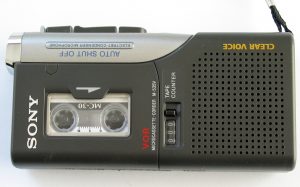Board Certified Family Law Specialist Matt Arnold answers the question: ” I’m considering separating from my spouse; what actions should I refrain from doing?”
Many divorcing spouses will stop at nothing to obtain a favorable divorce settlement, but how about recording your soon-to-be ex-spouse’s conversations secretly or spying on him or her? Does North Carolina make it illegal to wiretap your spouse?
 As smartphones have become a vital part of our everyday life, it is not surprising why spouses feel tempted to engage in surveillance and spying to get an upper hand in family law proceedings.
As smartphones have become a vital part of our everyday life, it is not surprising why spouses feel tempted to engage in surveillance and spying to get an upper hand in family law proceedings.
Everyone wants to have a reasonable expectation of privacy, but what do state and federal laws say about wiretapping your spouse in an attempt to obtain a favorable outcome in your child support, child custody, and alimony case?
Speak with our Charlotte family law attorney from Arnold & Smith, PLLC, to determine whether your recording of your spouse’s private conversations can be used as admissible evidence in family court.
Does Federal Law Allow to Wiretap Your Spouse?
The so-called Wiretapping Act – or the federal Electronic Communications Privacy Act – prohibits conducting surveillance. The law imposes criminal penalties on any person who intentionally intercepts or attempts to intercept any electronic, wire, or oral communication of any other person.
Initially, the federal law did not make it illegal for people to record their spouse’s phone conversations, but numerous cases involving wiretapping claims brought in federal courts imposed criminal sanctions for wiretapping your former spouse’s private conversations.
Federal courts impose limitations on the application of the Wiretapping Act regarding interceptions of communications. Some federal courts held that the term “interception” refers to when the act of surveillance occurs simultaneously with communications.
Interestingly, federal law does not apply to cases where a person “passively” or accidentally receives their spouse’s emails. However, copying and forwarding emails might be considered “interception.”
North Carolina’s Law Regarding Wiretapping Your Spouse
What does North Carolina’s law say about wiretapping your spouse? In 1995, state lawmakers passed the North Carolina Electronic Surveillance Act that prohibits a spouse from recording their spouse’s private communications without consent.
What is interesting is that North Carolina’s wiretapping law only prohibits you from recording your spouse’s oral communications. A secret video recording of your spouse would be against the law only if the footage captured audio of the spouse’s verbal communication.
Also, North Carolina’s law does not prohibit recording private conversations if at least one party to the conversation consents. Therefore, spouses going through divorce in North Carolina can legally record their conversation with the spouse because the recording spouse has consented to it.
Admissibility of Secret Recordings in Divorce Cases
So, can secret recordings be considered admissible evidence in divorce cases? In other words, can you submit evidence gathered through wiretapping in Charlotte or elsewhere in North Carolina to get an upper hand in a divorce case?
Although North Carolina – like most other states – make it illegal to use wiretapping evidence in family courts, your case might be an exception. Consult with a Charlotte family law attorney at Arnold & Smith, PLLC, to determine whether the secret recordings of your spouses can be used as evidence in divorce proceedings. If you find yourself facing a complicated family law matter and need the help of experienced family-law attorneys, speak with our detail-oriented and well-versed lawyers in or around Charlotte, Lake Norman, or at our new office in Monroe, please contact Arnold & Smith, PLLC today at (704) 370-2828 or find additional resources here.
The family law practice group at Arnold & Smith, PLLC includes two Board-Certified Family Law specialists and one Child Welfare Law specialist, as well as several attorneys with many years of family law experience that are committed to providing a powerful voice to individuals facing the often-tumultuous issues in this area of law. The range of issues our family law clients may be facing include pre- and post-nuptial agreements; separation agreements; post-separation support; child support (both temporary and permanent); absolute divorce; divorce from bed and board; military divorce; equitable distribution of assets; child custody (both temporary and permanent); retirement benefits and divorce; alimony and spousal support; adoption; and emancipation. Because this area of the law is usually emotionally charged and complicated, the family law attorneys at Arnold & Smith, PLLC act with the utmost dedication to ensure that each client understands his or her options, and then act to achieve the best result possible for that client’s particular situation.
Source:
Image Credit:
https://www.freeimages.com/photo/microcasette-recorder-1426595
See Our Related Video from our YouTube channel:
https://www.youtube.com/user/ArnoldSmithPLLC?feature=watch
See Our Related Blog Posts:
 Charlotte Divorce Lawyer Blog
Charlotte Divorce Lawyer Blog


